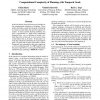Free Online Productivity Tools
i2Speak
i2Symbol
i2OCR
iTex2Img
iWeb2Print
iWeb2Shot
i2Type
iPdf2Split
iPdf2Merge
i2Bopomofo
i2Arabic
i2Style
i2Image
i2PDF
iLatex2Rtf
Sci2ools
103
Voted
IJCAI
2001
2001
Computational Complexity of Planning with Temporal Goals
In the last decade, there has been several studies on the computational complexity of planning. These studies normally assume that the goal of planning is to make a certain fluent true after the sequence of actions. In many real-life planning problems, the goal is represented in a much more complicated temporal form: e.g., in addition to having a desired fluent true at the end, we may want to keep certain fluents true at all times. In this paper, we study the complexity of planning for such temporal goals. We show that for goals expressible in Linear Temporal Logic, planning has the same complexity as for non-temporal goals: it is NP-complete; and for goals expressible in a more general Branching Temporal Logic, planning is PSPACE-complete.
Related Content
| Added | 31 Oct 2010 |
| Updated | 31 Oct 2010 |
| Type | Conference |
| Year | 2001 |
| Where | IJCAI |
| Authors | Chitta Baral, Vladik Kreinovich, Raul Trejo |
Comments (0)

